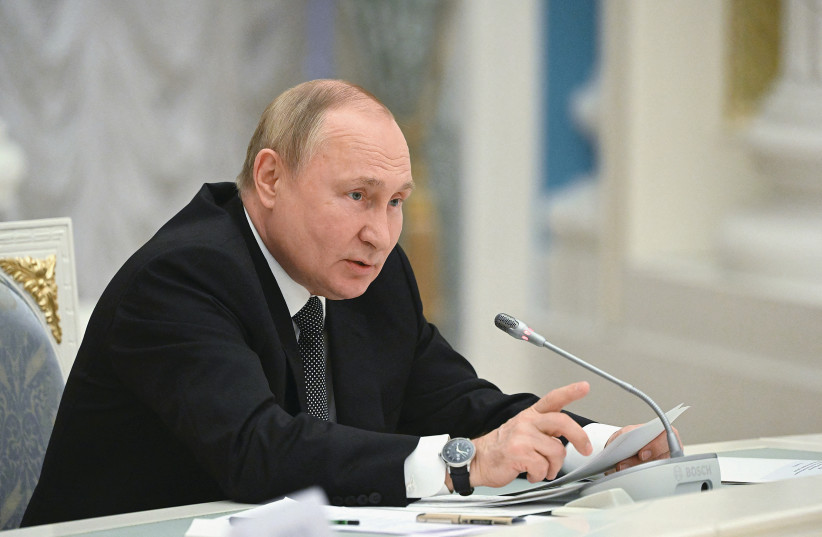Aside from Russian thinking about the conduct of the current war effort in Ukraine, there are signs that reflect a shift in the Western vision of this crisis. It is no longer just a question of direct military support for Ukraine. It is also about Western political positions, laws and legislation necessary to manage this crisis.
Chief among them is a bill recently passed by the US Congress aimed at accelerating aid to Ukraine. This legislation is 80 years old. Its first version was passed during World War II to oppose Hitler.
The Ukraine Democracy Defense Lend-Lease Act of 2022 was approved by the US House of Representatives by a majority of 417 votes to just 10 votes, after it sailed through the Senate unanimously. This legislation revives a program that allows the US to lend or lease military equipment to its allies. It can be used to help Eastern European countries that feel threatened by Russia and Ukraine.
US companies are allowed to quickly resupply partner countries without going through bureaucratic hurdles, with the possibility of deferred payment. The bill represents coverage of an additional $33 billion (NIS 110 b.) for Ukraine requested by the White House. That includes more than $20 billion (NIS 66) for weapons, ammunition and other military aid.
The bill adds up to a whopping $7 billion (NIS 22 b.) in European aid and output from an international donors’ conference. Observers view this legislation as official US participation in the war. But others see it as a reflection of US strategy to defeat Russia in a proxy war.

The Western views
The ensuing literature published in the West makes it clear that beliefs are forming as to what experts see as the imperative to defeat Russia. Some see the war in Ukraine as a challenge and an opportunity to defend Western liberal civilization. All actual and potential losses for Europe are not equivalent to victory in what they see as a much bigger issue.
An editorial in the British newspaper The Independent, for example, is “Like the real Nazis of the past, Russia must not win.”
The newspaper says the Russian armed forces disgraced themselves in Ukraine, believing that a sense of desperation is pushing Russia to focus on terrorizing civilians and threatening to use nuclear weapons, noting that the West’s escalation in response to atrocities in Ukraine reduces Russia’s chances of winning.
Several Western newspapers went in the same direction, looking for ways to support Ukraine and provide the ingredients for its victory over Russia. Some have even moved on to discuss what they called conditions for agreeing to end hostilities and save Russia’s face.
OTHERS SAW victory as inevitable for all of Europe if it wanted to live in peace, end the Putin era and doctrine, and turn the page on Russia’s claim to dominance in many countries in its vital sphere; a victory for Ukraine would prevent further wars in the region in the future.
And others went on to argue for backing Ukraine to win the war, listing other factors, such as contributing to rebalancing global food security, preventing potential worldwide hunger and avoiding the burden resulting from sheltering some 5 million Ukrainians in other European countries.
So, obviously, the assumption that the current war is between Russia and Ukraine no longer holds – it is gradually turning into a Russia-West war. In other words, what until a few weeks ago was a kind of overstatement now sounds more like reality. As an observer, I tend to have neither point of view as much as I try to grasp the facts and understand what’s going around.
Some high-ranking Western officials frankly admit that we are bracing for a new world war. Worse, the situation is headed for further deterioration if Finland and Sweden are accepted into NATO, where Russia is expected to come under greater strategic pressure. From its perspective, it could gain an excuse for further escalation and possible actions of uncertain consequence.
The fear is that things will go on an escalatory course amid miscalculations in attitude and reaction. What such proxy war might wind up with is a global nuclear conflict. No analytical overstatement here.
Russia has more than once brandished nuclear threats. Its warnings should not be downplayed. This comes amid swiftly decisive US military support for Ukraine.
US Secretary of Defense Lloyd Austin said that defeating Russian troops would not be enough. “We want to see Russia so weak that it can’t do the things it did like invading Ukraine,” he said. British Prime Minister Boris Johnson also told Parliament that “we must simply do everything we can collectively to ensure that Vladimir Putin fails, and fails comprehensively.”
There is also the position of France, which itself has broken its self-imposed silence about the weapons it is providing to Ukraine. Paris announced last week that it had loaned 12 Caesar gun systems and sent tens of thousands of missiles and anti-tank shells to Ukraine.
That has put to rest France’s official silence in order to maintain channels of communication with Moscow, announcing a united Western front in support of Ukraine. All this means is that a political or negotiated settlement that could end the war seems harder to reach - the West understanding that Putin cannot be seen as having been successful in moving the borders of Ukraine by force.
Ultimately, ending the Ukraine crisis is no longer as simple as it seemed at the outset of the crisis some two months ago. Rather, the cycle of conflict has become more complex on the ground, as well as in conceptual, political and strategic terms. It is no longer easy to come up with alternatives and proposals that will end the confrontation militarily and politically.
Strategic engagement has become more complex, difficult and deep than the conflict in the Ukrainian theater of war.
The writer is a UAE political analyst and former Federal National Council candidate.
